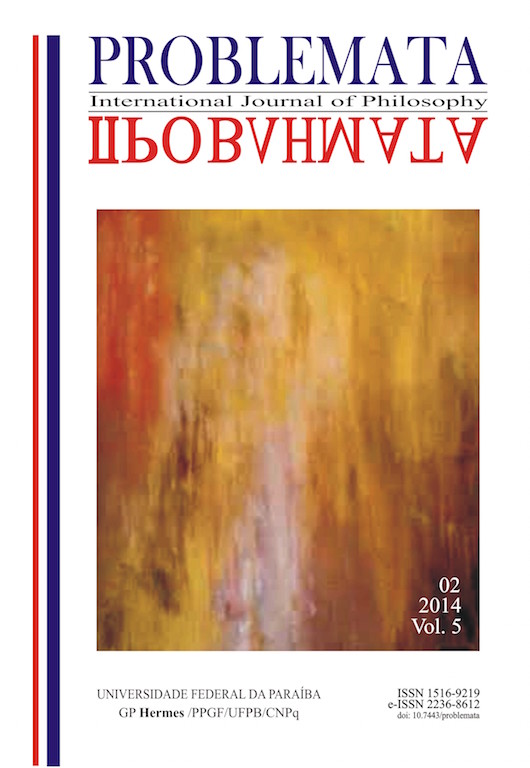FREGE: VERDADE E PENSAMENTO NA LÓGICA (1897) E EM DER GEDANKE
DOI:
https://doi.org/10.7443/21487Keywords:
Verdade, Lógica, Anti-psicologismo, Frege, Imanência, PensamentoAbstract
O conceito de verdade e de pensamento, bem como a defesa anti-psicologista de uma epistemologia objetiva da Lógica, presentes em der Gedanke de 1918, não significam uma ruptura em relação ao pensamento anterior de Frege, mas em essência já estavam presentes no texto de publicação póstuma Lógica, de 1897. A novidade em der Gedanke é uma argumentação contra o Princípio de Imanência, que Frege verifica estar presente em toda a argumentação psicologista de seus contemporâneos. O conceito objetivo de verdade leva à postulação do terceiro reino, dos objetos não-reais e objetivos, ao qual o pensamento pertence.
[doi:http://dx.doi.org/10.7443/problemata.v5i2.21487]
Downloads
References
COSTA, C. F.; FREGE, G. (1999). Estudos filosóficos. Rio de Janeiro: Tempo Brasileiro. [DG]
FREGE, G. (1991). Posthumous writings. [LO]
PORTA, M. A. G. (2009). A crítica de Frege ao idealismo em Der Gedanke. Veritas–Revista de Filosofia da PUCRS, 54 (2).
Downloads
Published
Issue
Section
License
Authors who publish with this journal agree to the following terms:
- Authors retain copyright and grant the journal right of first publication with the work simultaneously licensed under a Creative Commons Attribution License that allows others to share the work with an acknowledgement of the work's authorship and initial publication in this journal.
- Authors are able to enter into separate, additional contractual arrangements for the non-exclusive distribution of the journal's published version of the work (e.g., post it to an institutional repository or publish it in a book), with an acknowledgement of its initial publication in this journal.
-
- Authors are permitted and encouraged to post their work online (e.g., in institutional repositories or on their website) prior to and during the submission process, as it can lead to productive exchanges, as well as earlier and greater citation of published work (See The Effect of Open Access).





